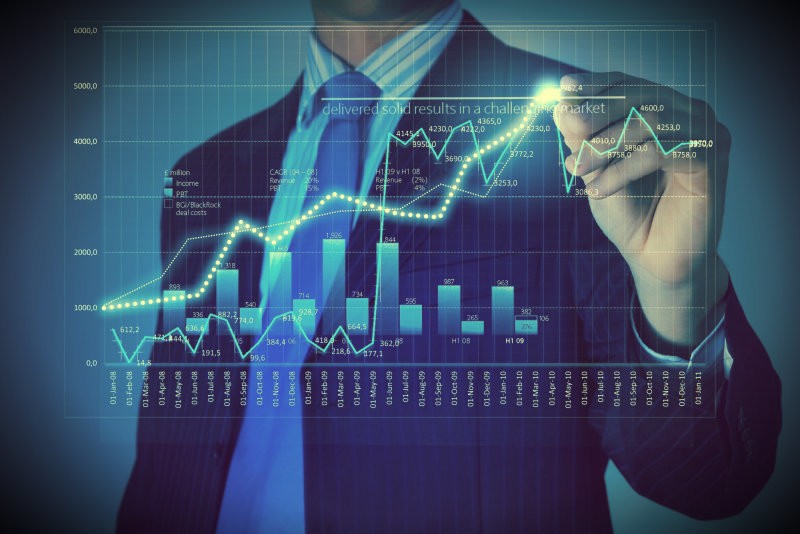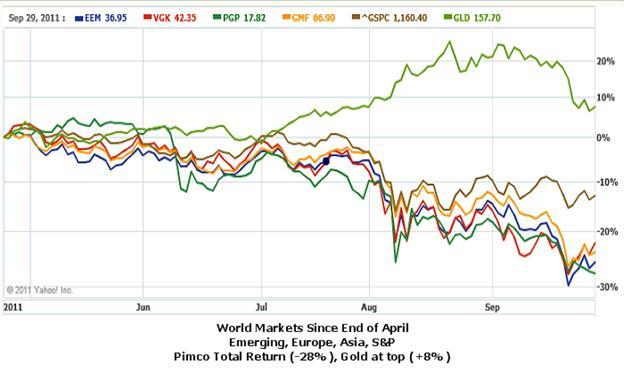October 4, 2011
 Finally, it appears that Europe may act – right or wrong, they appear ready to do something about the sovereign debt crisis’ of Greece, Italy and other PIGS nations. We have used cash and short positions to hedge against the markets over the past five months and they have helped considerably, but positive actions by Europe and China should put the wind at our back. With that in mind, we have removed all hedges and are now cash and long. The first and most in-your-face, is Europe’s sovereign debt. Germany has ratified the European equivalent of TARP and now only a couple of nations remain. Why did Europe ever put together a system of 17 nations which must vote unanimously for any change? The second event looks closer as of an hour ago (4:30 am CST). China announced stronger growth numbers than generally expected and said they expect their currency to continue its steady appreciation (much of our cash is in Chinese renminbi or renminbi). We will start adding renminbi denominated, short-term bonds as a safe parking spot. They average about 2.5% (net) and the renminbi has rather steadily climbed 6.5% against the dollar in the last twelve months. With China’s intentions well established, we can expect the same going forward. It is exactly as I have expected and previously discussed, since it is in China’s best interest. Since they are entirely in control of their currency, it is the one given in an unpredictable world.
Finally, it appears that Europe may act – right or wrong, they appear ready to do something about the sovereign debt crisis’ of Greece, Italy and other PIGS nations. We have used cash and short positions to hedge against the markets over the past five months and they have helped considerably, but positive actions by Europe and China should put the wind at our back. With that in mind, we have removed all hedges and are now cash and long. The first and most in-your-face, is Europe’s sovereign debt. Germany has ratified the European equivalent of TARP and now only a couple of nations remain. Why did Europe ever put together a system of 17 nations which must vote unanimously for any change? The second event looks closer as of an hour ago (4:30 am CST). China announced stronger growth numbers than generally expected and said they expect their currency to continue its steady appreciation (much of our cash is in Chinese renminbi or renminbi). We will start adding renminbi denominated, short-term bonds as a safe parking spot. They average about 2.5% (net) and the renminbi has rather steadily climbed 6.5% against the dollar in the last twelve months. With China’s intentions well established, we can expect the same going forward. It is exactly as I have expected and previously discussed, since it is in China’s best interest. Since they are entirely in control of their currency, it is the one given in an unpredictable world.
There is still a third big issue that will put the wind at our economy’s back and would make market gains an easy proposition. It would go a long way towards solving the unemployment and housing problems. It would reduce, almost eliminate, our export deficit and reduce the threat of terrorism. I encourage you to let the President and Congress hear from you on the topic. It is simply an energy policy. Short-term, start drilling for our own oil. It will greatly reduce the cost of gasoline, putting extra money into the economy instead of sending it to OPEC. Just 2 ½ years ago the national average cost for a gallon of gasoline was $1.73 but the moratorium on drilling has reduced global supply, resulting in an increase in the cost of oil and putting more money in terrorists hands. Long-term, we should convert our trucks and cars to natural gas. We have more than a 100 year supply and it is clean burning. The number of jobs the two solutions would create would be in the millions, which would obviously spur the economy and spill over to housing.
Before I go forward and discuss the Fed, the economy and China, in more detail, I want to show you the following graph. It should put into perspective exactly what we have been dealing with. The following shows the relative performance of the various world indexes and gold. Even gold retreated in September (there were two margin requirement increase which caused much of the (temporary) retreat). Down months are never a good thing, but try to remember others, like the end of 2008, where we rebounded very quickly. I expect we will be able to do the same this time. All losses hurt, but we have actually dropped very little relative to the world indexes which are down an average of 24% since the end of April. We have a lot of cash that can be put to work when the big sovereign debt issues are resolved and when the emerging markets resume their more obvious growth. But as I stated earlier, we plan to tread water in the meantime and wait for these issues to be clearly solved.
The Fed
Whenever speaking before a Congressional committee, former Fed chief, “Easy” Al Greenspan was fond of saying, “I guess I should warn you. If I turn out to be particularly clear, you’ve probably misunderstood what I’ve said.” His protégé, Fed chief Ben “Bubbles” Bernanke borrowed the script from his mentor, and speaking in Jackson Hole, Wyoming on August 26th, – left most his audience wondering what he meant.
At the end of the day, it was generally understood that while the Fed hasn’t made a final decision so far, Bernanke was careful to keep the dream of QE-3 alive. “The Committee will continue to assess the economic outlook in light of incoming information and is prepared to employ its tools as appropriate to promote a stronger economic recovery in a context of price stability,” Bernanke said. Adding a new twist, he said the September policy meeting will be extended to two days, instead of just one, to allow for a fuller discussion, suggesting a “pleasant” surprise (QE-3) could be in the offing next month. Since then, several Fed governors have indicated that they would back another round of QE should the economy show clear signs of sliding towards another recession. And just this week, Mr. Bernanke said the same.
Operation “Twist” began last week with the Fed pledging to buy longer-term U.S. Treasuries. I guess Bernanke and friends believe that business is not borrowing to expand because the 10-year rate was 2.25%. Certainly, by driving that rate down to below 2%, …that will change? Hopefully, that is the precursor to a Refinance Bill that will allow qualified home-owners to quickly and easily refinance their homes at very low rates. That would create a huge stimulus to the economy, one which continues every month for years, and without taxpayer expense. Of course, it takes a President and a Congress to pass the bill or the Fed action is basically useless if not harmful. Again, if such a bill is enacted, we will respond, but not before it is passed by both houses and signed by the president.
The Economy – Double Dip?
 Investing Rule 1 of 1 : The economy and the markets seldom reflect each other. As I discussed in a recent letter, one should not confuse a bad economy for a bad investment environment. That is true of most weak economies and even recessions, but this government has brought us to a meaningful chance of depression, thus the forced decision to hunker down our investments and wait.
Investing Rule 1 of 1 : The economy and the markets seldom reflect each other. As I discussed in a recent letter, one should not confuse a bad economy for a bad investment environment. That is true of most weak economies and even recessions, but this government has brought us to a meaningful chance of depression, thus the forced decision to hunker down our investments and wait.
Today, if you are looking for a job, the world may appear hopeless. With over 9% unemployment and around 17% of the workforce underemployed, America is less than vibrant. But when you look at corporate America, it is a different picture. Corporate America is in perhaps, its best shape since the 1980’s. Balance sheets are robust, earnings are growing and cash is at record levels. The disconnect is at the cross-section with government. Those with the capacity to hire are simply immobilized. How can you budget or manage to the unknown of fiscal and regulatory policy? In an environment where companies question the potential demand for their goods and services, there is good cause to be hesitant about hiring new employees.
Add a president and a congress who bombard the consumers with a constant tome of the sky is falling, why would anyone rush out to spend a dime of what might be the last dollars they should ever have? The leadership of our nation, along with a compliant media, convinced most of the world of an impending disaster called the debt ceiling and went on to target D-day as August 2nd. As the days and weeks passed with the president on television almost every day speaking of the coming financial disaster, and the Republicans and Democrats arguing as to who was at fault, why would anyone expect the consumer to do anything but hunker down?
With the European Central Bank and Euro Zone enacting the same play across the ocean, there is little surprise that the last couple of months have stripped the MSCI World Index of some 27% of its value. But again, this problem has been kicked down the road and one would hope that the real solution being voted upon now, will pass all 17 Eurozone countries and finally begin the cure.
Gold
Mark Twain once said, “If you don’t read the newspaper you are uninformed, if you do read the newspaper you are misinformed.” The constant barrage of barely informed reporters constructing stories to explain the stock market, interest rate moves, or the value of gold, are more likely to misguide the viewer than inform. The story about gold is a good example. According to most journalists (most of which have very little or no personal investments), gold is in a bubble about to pop. And it has been for years, so now it must be true. They compare it to its inflation adjusted value or discuss the 75-year average return (the first 35 of which it was pegged by the government at $35/ounce so there was no gain). Liam Denning of the Wall Street Journal declares that it cannot be a hedge against the falling dollar since “gold’s 22% gain since April has happened while the dollar has not really moved”. Mr. Denning appears to miss the fact that he compares the dollar only to the dollar index, comprised mostly of the euro, along with the pound and yen. Certainly, it helps his case if you ignore the fact that the euro, pound and yen are all devaluing along with the dollar. I always liken it to four men standing in quicksand and comparing their height. You may not be believe you are sinking if you only look at your three doomed friends, but it will become apparent that you have been, once the sand is at your nose. Mr. Denning goes on to say that “the past few decades suggest it (is not a store of value), but again he misses the point. Gold is a real currency and has been for thousands of years. The dollar was an acceptable currency and store of value until persistent government deficits and an insurmountable debt. It was only then that wise investors determined that a return to a real currency, gold, was a good insurance policy against governments that owned printing presses that can churn out fiat paper currency at any volume desired.
Gold will rise – sometimes too fast, and gold will fall, only to rise again. And finally, gold’s rise will end, but I can only think of three scenarios in which that will happen (none are here today). The first is one in which the U.S. and European governments actually pass budgets that they can afford – no more deficit spending – no more currency printing to pay for their overspending. The second scenario would include a world in which currencies, again, are backed by gold or some other hard asset or combination of assets. The third scenario would entail a single world currency which only increased in volume based on a formula which included population and world GDP. Make real progress towards any one of those three scenarios and you can be assured that we will no longer own gold.
China
 We truly are living in a “flat earth” economy in which every part affects every other. In stock markets this flat-earth effect is magnified by many ETFs which move entire sectors in tandem, whether or not the companies they hold are good or bad.
We truly are living in a “flat earth” economy in which every part affects every other. In stock markets this flat-earth effect is magnified by many ETFs which move entire sectors in tandem, whether or not the companies they hold are good or bad.
China was affected disproportionately in this latest blast of volatility, but the economy remains in a strong growth pattern. Inflation remains somewhat of a problem, but is overstated at this time. China has raised interest rates six times in the last year and bank reserve requirements some eleven, and are allowing their currency (renminbi) to appreciate, all of which bring real interest rates well above the inflation rate. The biggest threat to China remains external, not internal.
It is true that a slowdown in European imports from China would hamper the nation’s growth trajectory by a fraction of a percent according to the latest projections, but the market has responded more dramatically, as if China’s entire economy could suffer a hard landing because of weak exports. The numbers do not bear this out. In fact this is a clear case of irrational markets at work.
Market valuations have now done much more than factor in a worst case scenario. They have priced in valuations of some companies well below book value. It is an absurd prospect to imagine that Chinese firms have been priced as if they will have no sales growth at all for years, but that’s what the market is saying right now and it is tough to argue with market volatility. The upside is that there will be buying opportunities as this phase of volatility passes. Stocks are very, very cheap. And, as the saying goes, it makes sense now to buy low and sell high later.
Investment Perspective
We are now beginning to move more cash back into the market. We will do this slowly in expectation of a positive European resolution and expecting Chinese monetary easing to take place in the next few months. We have been rotating our portfolio towards more companies that have high dividends, attractive valuations and are generating a large percentage of their revenue from non-US, non-European customers. Intel is a good example. It has a 3.9% dividend, a 10 P/E with an 8.9 forward P/E, a PEG of 0.83 and generates 75% of its revenues outside the U.S. and Europe. There are a number of technology companies, food companies (McDonalds & Yum Brands), and others who are growing their sales in China, which we own and will add to the positions where appropriate.
We are adding short-term bonds (Bernanke has given us a guarantee) and we are finding good bonds denominated in non-dollar currencies. Many large international companies issue bonds in a number of currencies where they do business. One might buy a General Electric bond in a number of currencies. They are (typically) backed by the same company and only the interest rate and currency exchange rate may differ. With most currencies appreciating against the dollar, a bond portfolio diversified among countries can offer the opportunity for higher yields and the possible appreciation due to currency appreciation. Hong Kong bonds denominated in the renminbi (yuan) are, in my estimation, some of the best since the Chinese will either continue to appreciate their currency or at worst, peg to the dollar.
Finally, in moderate to aggressive-risk portfolios, we will be adding more natural resource companies such as Freeport McMoran. Chinese copper inventories have been dropping – combine that with Chinese monetary easing and this beaten down sector is rotating back into favor. Other minerals and even oil and natural gas are attractive – natural gas will soon be exported to Asia and Europe in the form of LNG (liquefied), helping the exploration companies that have been beaten down by very low prices. Natural gas prices should rise to the $5 to $7 range in the next year or two as LNG is exported and the exploration companies exit remaining contracts that required them to drill to retain leases. They have met their requirements and the newer contracts contain pricing contingencies so they will no longer be required to drill when prices are too low.
享受好天氣和一個更好的股市 (Enjoy the good weather and a better stock market),
Frank
512.345.6789
2009 S. Capital of Texas Hwy. 2nd Floor
Austin, TX 78746
Beck Capital Management
Pro Player Investing
Beck Capital Management LLC, a Registered Investment Advisor, Frank Beck, Chief Investment Advisor. Fidelity Investments, custodian.
Disclosure: Nothing contained herein is to be considered a solicitation, research material, an investment recommendation or advice of any kind. The information contained herein may contain information that is subject to change without notice. Any investments or strategies referenced herein do not take into account the investment objectives, financial situation or particular needs of any specific person. Product suitability must be independently determined for each individual investor. Frank Beck & Beck Capital Management explicitly disclaims any responsibility for product suitability or suitability determinations related to individual investors. The investment products discussed herein are considered complex investment products. Such products contain unique risks, terms, conditions and fees specific to each offering. Depending upon the particular product, risks include, but are not limited to, issuer credit risk, liquidity risk, market risk, the performance of an underlying derivative financial instrument, formula or strategy. Return of principal is not guaranteed above FDIC insurance limits and is subject to the creditworthiness of the issuer. You should not purchase an investment product or make an investment recommendation to a customer until you have read the specific offering documentation and understand the specific investment terms and risks of such investment.
This material represents an assessment of the market and economic environment at a specific point in time and is not intended to be a forecast of future events, or a guarantee of future results. Forward-looking statements are subject to certain risks and uncertainties. Actual results, performance, or achievements may differ materially from those expressed or implied. Information is based on data gathered from what we believe are reliable sources. It is not guaranteed as to accuracy, does not purport to be complete and is not intended to be used as a primary basis for investment decisions. It should also not be construed as advice meeting the particular investment needs of any investor. Past performance does not guarantee future results.


